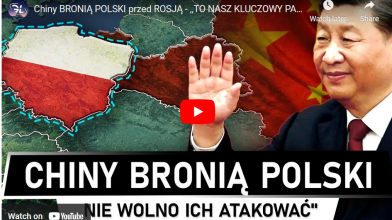Vision for Poland (part I)
I agree with Ziemkiewicz around the 4:00 minute mark of his column. As a contemporary media humanist, he tells us: "What is missing today is a narrative, a general narrative... our times are marked by a general lack of concepts... No one can set a goal for Poles, for example, such as Kennedy set a goal for the Americans, until the end of decades, when they decided to set foot on the moon. And they did it."
What is he talking about? About the fact that we have no vision, we have no vision of the future for Poland.
In this column, I will show, as I previously did here, exactly the vision for Poland that Ziemkiewicz is asking for. A visa, or rather a vision will give us a visa to the future world; such a goal that will finally give us wings to soar into the sky.
A similar dream was dreamed a year ago by Arestovych, one of the current candidates for the President of Ukraine (1.1/23): "Such a war is worth nothing less than a true vision of the future. A vision that is transcendental in nature. The requirement that the vision be transcendental is necessary for people's motivation. We can, we must fight for something bigger than ourselves. And this is the transcendental nature of vision."
Currently, after a year, Ukraine is in a very difficult situation, and of course, by association, so is Poland. I am writing these comments the day after Zielensky's visit to the US in December. In fact today's morning dispatches announce that he will go back empty-handed!
And I must say I am not surprised. I have been living in NYC for the last 55 years. Knowing Yankee state of mind I have been quite surprised that they have engaged until now to the degree they did. Americans, on the institutional level, do not particularly care what's happening in the rest of the world. That has two consequences.
First, Trump may win the election next year, and knowing his past friendship with Putin, it's very doubtful whether he will support Ukraine. Second, as Budzisz titled his first book, Strategic Solitude of Poland, Poland indeed is alone in formulating its strategy in Middle Europe. That's how it should be, if Poland is to get on its own legs, not only internally as the economic "tiger" of Europe but also as a nation among nations, it must develop its own strategy, and its own future instead of constantly waiting till "someone else will do their job" – as carries the contemporary opinion about Poland in the world, in US.
That's why the continuous conversations prompted by Strategy and Future while very brilliant, are conceptually sterile because they are based on the fundamental strategic assumption of blocking Russia's participation in Europe, and therefore are condemned to the repetitions of the events.
Let's listen to a conversation with Glen Dissen from Oslo (i.e. from far and near at the same time) about the current situation:
Glenn provides a very important assessment of the situation at 2:41 minute: Already on the third day of the war, Ukrainians and Russians were ready to sit down to peace negotiations with one fundamental demand of neutrality and not joining NATO.
It was US and UK that undermined the peace process. Their message was clear: If you continue fighting with Russia we will give you all the weapons you need, we will be with you till the end. If the US doesn't want to give any more weapons that's a betrayal.
The war became stalemate due to the Ukrainian offensive's collapse, turning into a war of attrition. It is an existential problem for both countries. If Ukraine loses, its existence is in doubt hence Ukrainians are fighting for their very existence. On the other hand, if Russia loses Crimea, NATO will move in there therefore it is an existential threat to Russia. That's why they will be fighting till the end, that is until one of them is defeated.
Since the war is an existential threat to Ukraine & existential threat to Russia the only way out is peace, and the only way to achieve it is by taking the Russian army behind Ural and NATO out of Europe.
And here is the incredible chance for Poland – to be the peacemaker between East and West, between Ukraine and Russia, among us.
be a peacemaker between the East and the West, between Ukraine and Russia, among us. This idea of changing Polish policy has already been presented here in subsequent columns: War (11/11/22); A look at the war from Ukraine (7,12,22); Arestovych, Ukraine and Poland (1/1/23); and also in response to Zechowicz's question in Can Russia win the war? (8/5/23).
War forecasts a year ago were more favorable to creating such a situation; Together with Bonikowska, head of the think tank Center for International Relations, we hoped that Ukraine would put Russia in a checkmate situation on the battlefield. Russia escaped from this possible trap, changing the battlefield into a stalemate from which Ukraine may never escape. Where then is the hope for peace?
Putin's goal in February 2022 (and now) was to eliminate NATO from Eastern Europe. This eliminates the threat to Russia, but not to Central Europe. However, the complete removal of NATO from Europe and the simultaneous removal of the Russian army beyond the Urals fulfills both conditions: elimination of the threat to Russia and elimination of the threat to Central Europe. Both the US and the Russian Federation may be interested in such a radical solution to the situation: for the US because it allows it to focus on the Pacific, for Putin because it distances NATO not only from Russia but from all of Europe and allows for increased attention to Asia. It is clear that both powers are turning their attention to the Far East - maybe they will break the trap.
What could be Poland's role in such a situation??


